



In this special feature Steve Jampijimpa Patrick writes about YAMA, the name given to the installation currently on display as part of the exhibition Networking the Unseen at Furtherfield Gallery.
* * * * * * * * * * * *
I want to tell you about YAMA. This is the Warlpiri word for a shadow, or reflection. It’s also a word that we use to describe a meeting or a meeting-place; we gather under a tree that casts a shadow (a reflection of its shape) onto the ground, and we talk in a group – both men and women together, equally – to make decisions and to reflect on ourselves and our lives. But it’s deeper, too. In yapa (Aboriginal) culture, if someone says “you don’t have a shadow”, it means you don’t exist. All the birds, all the small animals, trees – these things all have a shadow; all of your country and everything in it; this is your universe. How can you reflect your universe? And what about you, reader? Does your homeland reflect you?
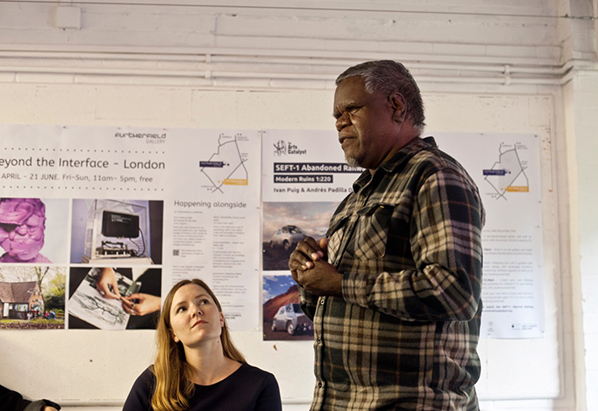
I’ve been all over the world, searching for ngurra kurlu (the home within). Each country’s, each people’s ngurra kurlu is different. If you don’t speak your language, if you don’t know your culture, the songlines of the animals in your country, how can you express yourself or where you’re from? This reflection happens through language, through dance, art, even food – that’s ngurra kurlu. There is a universe and we are its shadow.
We yapa say “don’t become Australian, become Australia”.
That’s ngurra kurlu.
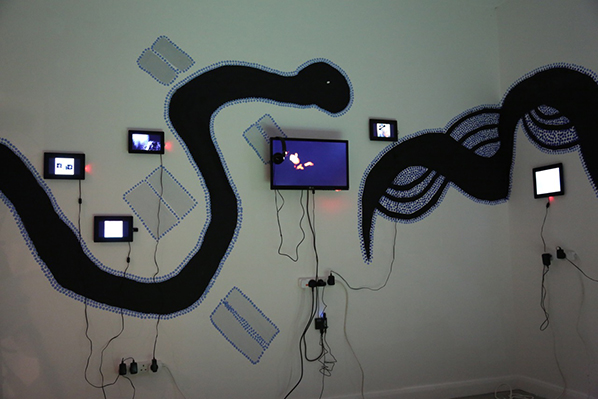
I am writing this from Germany, we (Neil Jupurrurla Cooke and I) were in England for a week working on YAMA, a multimedia installation with Napanangka (Gretta Louw) for the Networking the Unseen exhibition at Furtherfield. Every day we walked through Finsbury Park and the people we saw were really alive there, playing, walking, school children running through, watching the birds and the squirrels. But when we go into town, we feel closed up again. We went to the Horse Guard. Where I come from, the horses roam free – they are really alive. We don’t know their skin name , we don’t have a song for them because they’re feral animals, brought into our country by kardiyah (white people) – but they’re free. When we see the horses there in London trained to stand still like that, like they’re stone, we feel sad for them.
Then we look around and see those buildings round there (in Westminster). We’ve seen those buildings before. Even though we’d never been to London. They’re like underwater, you know, that coral when it dies – when it’s bleached – that’s what those buildings are like. Every thing, both living and created by the living, is a reflection of our universe. Imagine you are a little ant and you are walking through tombstones – this is how it feels for us to be in that place. I guess the people that made those towers are trying to express power, they want to have power over other people. They build those bleached towers and statues tall on columns to make the other people feel small. That’s a crazy world, when I’m coming at it from my culture.
Your home is going to reflect you and you’re going to reflect your home. So, think about your home and what it says about you.
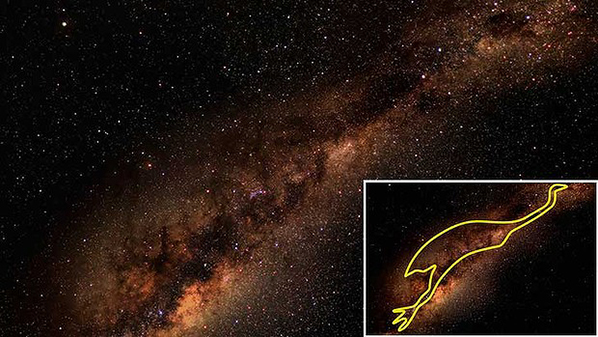
For us, the things we look up at are the stars. We’ve always known them and learned from them. They are part of our ngurra kurlu. What about that North star that you have here in the northern hemisphere – they say it doesn’t move. Maybe that’s why you have one leader, one queen, who doesn’t change. Down in Australia, we have five emus (the southern cross) – we live by that law. We call ourselves an emu country. You bear countries reflect your stars, too. I like to think that the queen is the ultimate kurlungu (guardian) for the country, but a kurlungu needs to really look after all their people and their country. Is that what’s happening in your country?
I wonder what would happen if you brought an emu up here and just let it walk around. I’ve never seen it but I think it might start heading south. We have a word for ocean, mangku-rla, even though we’re a desert mob. This shows how ancient our songlines are – they existed before us; they created us. We were supposed to be noble savages, from the settlers’ point of view we weren’t supposed to know about the ocean or what was on the other side, but our Emu Dreaming tells the story of the emu swimming across the ocean. He was a nervous emu because he was being chased into the water by dogs. I think that was when the emu went between the continents to make relations with the ostrich and the rhea bird and the moa. There were big, flightless birds like the emu on each of the continents. In the Jardiwanpa story, the emu comes out of the water and shakes himself like a dog. This is reflected in the stars as well; our emu stars (the English name is the Milky Way) come up after the wet season.
In yapa culture, we know that we didn’t create the body: our universe, our country created us. That’s why I am a black man from Australia – my country made me like this. This is what you call evolution. You can have bears in the north, and we have emus in the south. Our countries created those beings. Yapa have always known that this is how things are created.
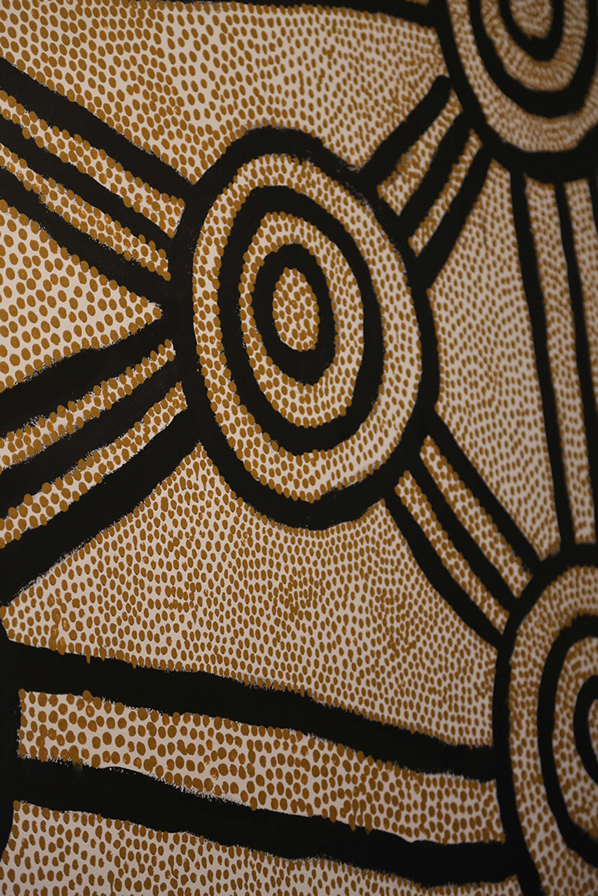
You live in the bear countries; even without people knowing it, they are reflecting what the bear is trying to teach them. We live by the emu. I can’t tell you what the bear is teaching you, I’d need to live here a lot longer, but you can learn to hunt the knowledge that the bear is trying to show you.
There are food sources for your stomach and there are some for your mind. Both are equally important. If you are hunting for goanna you bring it home and share it with your family and your community. If you are sitting, talking, learning that’s also hunting – you are hunting knowledge and you bring it home and share it with your people. The mind and the physical reflect each other – that’s yama.
The Australian coat of arms is meaningful to us, even though we weren’t asked to choose it. The emu is our teacher, wise and kind, and the kangaroo is like a warrior or a judge, strong and powerful. The nature of our land, our country, is reflected in this coat of arms. When I look at the English coat of arms, I see a lion and a unicorn. Do these animals come from your country? What does this coat of arms represent and what does it reflect about your country?
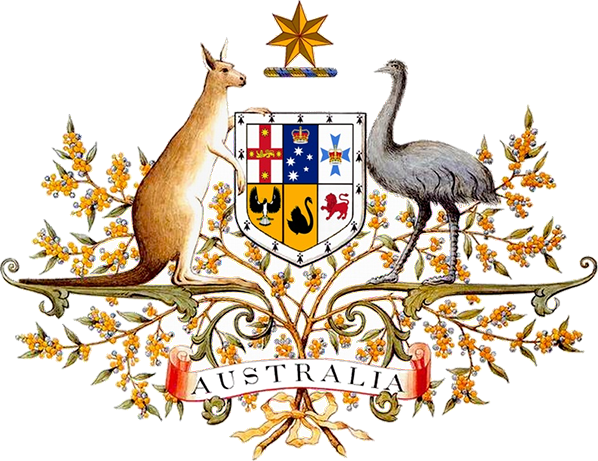
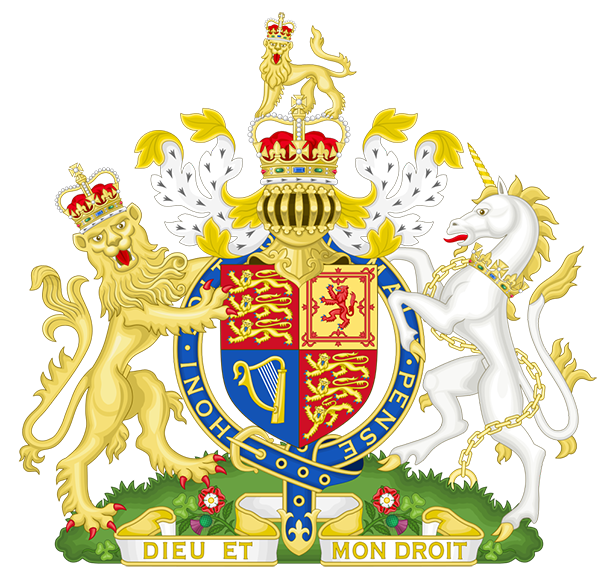
When I ask you to help me hunt the unicorn, will you understand what I mean?
Hunting the unicorn is a way to understand its ngurra kurlu, to try to understand the country and therefore to understand the people. After all, if you’re hunting something, you have to learn to think like the animal that you’re hunting. It’s a way to fit into the country and to feed on that country; that country nourishes you. That’s the most important skill you can have. It’s a skill to understand the prey, and to think like the prey. It’s something I never understood before. But now I do.
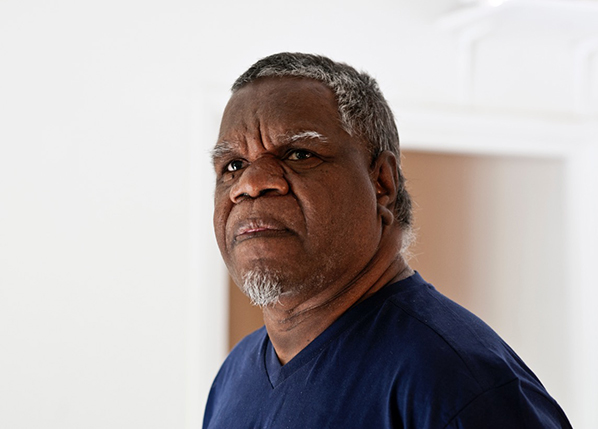
If you know how to reflect yourself, you can then reflect other people. Don’t try to do it back to front.